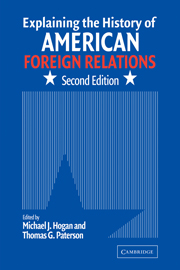Book contents
- Frontmatter
- Contents
- Preface to the Second Edition
- Contributors
- 1 Introduction
- 2 Defining and Doing the History of United States Foreign Relations : A Primer
- 3 Toward a Pluralist Vision : The Study of American Foreign Relations as International History and National History
- 4 Theories of International Relations
- 5 Bureaucratic Politics
- 6 Psychology
- 7 National Security
- 8 Corporatism
- 9 World Systems
- 10 Dependency
- 11 Considering Borders
- 12 The Global Frontier : Comparative History and the Frontier-Borderlands Approach
- 13 Modernization Theory
- 14 Ideology
- 15 Culture and International History
- 16 Cultural Transfer
- 17 Reading for Meaning : Theory, Language, and Metaphor
- 18 What's Gender Got to Do with It? Gender History as Foreign Relations History
- 19 Race to Insight: The United States and the World, White Supremacy and Foreign Affairs
- 20 Memory and Understanding U.S. Foreign Relations
- Index
10 - Dependency
Published online by Cambridge University Press: 05 June 2012
- Frontmatter
- Contents
- Preface to the Second Edition
- Contributors
- 1 Introduction
- 2 Defining and Doing the History of United States Foreign Relations : A Primer
- 3 Toward a Pluralist Vision : The Study of American Foreign Relations as International History and National History
- 4 Theories of International Relations
- 5 Bureaucratic Politics
- 6 Psychology
- 7 National Security
- 8 Corporatism
- 9 World Systems
- 10 Dependency
- 11 Considering Borders
- 12 The Global Frontier : Comparative History and the Frontier-Borderlands Approach
- 13 Modernization Theory
- 14 Ideology
- 15 Culture and International History
- 16 Cultural Transfer
- 17 Reading for Meaning : Theory, Language, and Metaphor
- 18 What's Gender Got to Do with It? Gender History as Foreign Relations History
- 19 Race to Insight: The United States and the World, White Supremacy and Foreign Affairs
- 20 Memory and Understanding U.S. Foreign Relations
- Index
Summary
Systems of domination are often transmitted and replicated in the most innocent forms: through mass media, for example, by way of film and television, sometimes through musical idioms, occasionally by way of fashion and style, through consumption habits and the iconography of popular culture – in sum, within normative systems embedded in notions of progress and modernity and subsequently insinuate themselves in the vernacular forms by which people transact daily life. More than twenty-five years ago, Ariel Dorfman and Armand Mattelhart chronicled the presence of Donald Duck in Latin America. Donald Duck was identified speaking Spanish and Portuguese, and appeared serialized in the comic strips of scores of newspapers and magazines. The Disney comic book appeared in at least four different Spanish-language editions. In thousands of movie houses and on hundreds of thousands of television screens across the Hemisphere, the accumulated inventory of decades of Disney animated films has played and replayed to the squealing delight of successive generations of unsuspecting Latin American children.
Who was this Latin American incarnation of Donald Duck (“el Pato Donald”)? He was North American, and he embodied North American cultural norms and articulated North American ideological imperatives. In dialogue with his nephews, he talked politics; in conversation with his uncle, he discussed economics. The moral was not obvious, but it was never disguised: the virtues of capitalism, the vices of communism. Donald Duck was an agent of imperialism.
- Type
- Chapter
- Information
- Explaining the History of American Foreign Relations , pp. 162 - 175Publisher: Cambridge University PressPrint publication year: 2004
- 1
- Cited by



